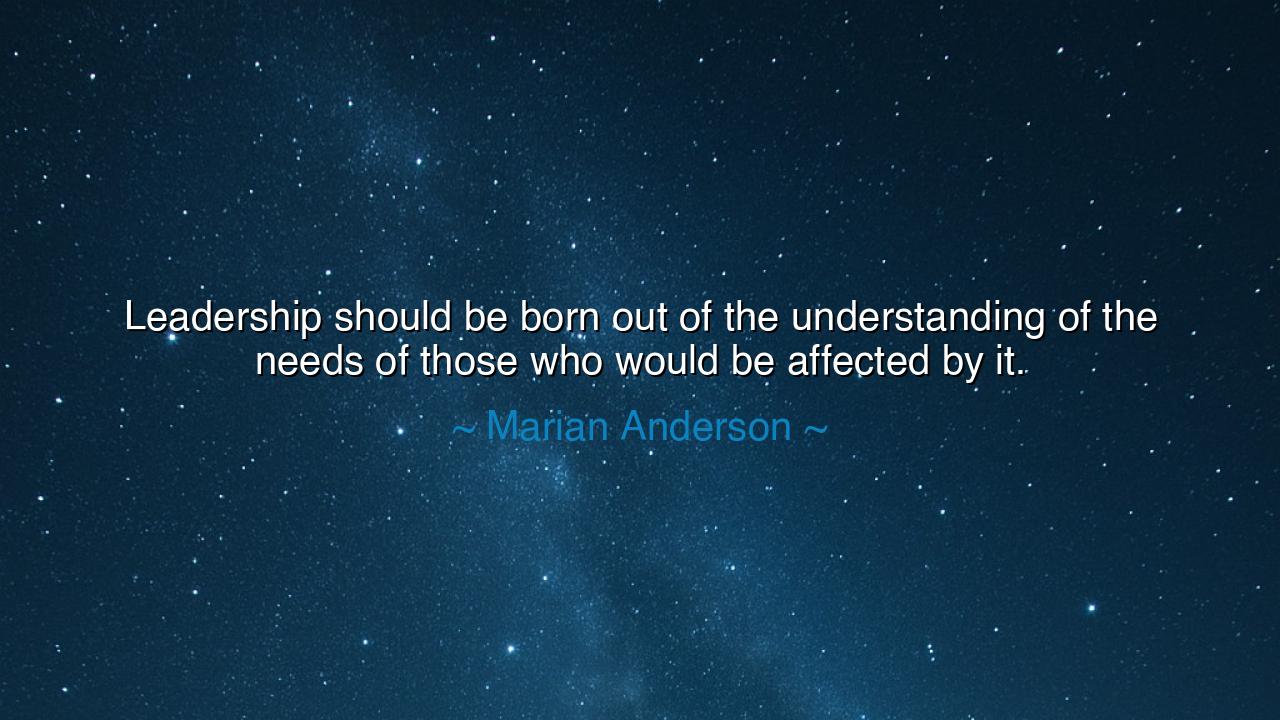
Leadership should be born out of the understanding of the needs
Leadership should be born out of the understanding of the needs of those who would be affected by it.






“Leadership should be born out of the understanding of the needs of those who would be affected by it.” — Marian Anderson
Listen well, O child of wisdom and servant of the greater good, for in these words of Marian Anderson lies a truth as timeless as the human heart itself. When she spoke, she was not speaking of authority or command, but of understanding — the sacred foundation upon which all leadership must be built. For leadership, in its truest form, is not the art of control, but the calling of empathy. It is born not from the desire to rule, but from the courage to serve. Anderson, a woman whose voice once shook the walls of oppression and stirred the conscience of a nation, knew well that a leader must first listen before they can guide, must first understand before they can decide.
The origin of these words flows from the life of a woman who knew both greatness and humility. Marian Anderson, born in 1897, was one of the most celebrated voices of her age — yet she lived through an era that denied her the stage because of the color of her skin. When she was barred from performing at Constitution Hall in 1939, she did not answer with anger, but with dignity. With the support of Eleanor Roosevelt and others who understood the moral power of justice, she sang instead on the steps of the Lincoln Memorial before 75,000 souls. Her song, rising over the capital, was not merely music — it was a message of unity, empathy, and understanding. Her leadership came not from command, but from compassion.
When Anderson said that leadership should be born out of understanding, she was speaking from that deep well of experience — the knowledge of pain, of exclusion, of endurance. True leadership, she knew, cannot be forged in isolation or arrogance. It must be shaped by awareness of the people one serves — their struggles, their dreams, their fears. The leader who rules without understanding is like a captain steering by blindfold, guiding neither ship nor crew but only his own pride toward ruin. The wise leader, by contrast, listens to the heartbeat of the people; he learns their stories, feels their burdens, and in that shared humanity, finds the strength to lead justly.
Consider the story of Abraham Lincoln, who, though a man of power, was a man of compassion first. In the midst of civil war, when his cabinet urged vengeance and expedience, he refused to abandon his empathy. He understood the sorrows of both North and South, the suffering of soldiers and slaves alike. His greatness lay not in authority, but in understanding — his capacity to feel the pain of those his decisions would affect. He led not through command, but through conscience. Like Anderson, Lincoln’s strength flowed from the wellspring of empathy — and it was this that made his leadership eternal.
For to understand others is to bridge the distance between hearts. The tyrant speaks from the throne; the leader speaks from within the crowd. The tyrant demands obedience; the leader inspires trust. The tyrant seeks glory; the leader seeks purpose. Thus Anderson’s words are a warning to every age: leadership without understanding becomes domination; authority without compassion becomes cruelty. It is not enough to possess power — one must also possess the wisdom to wield it for the good of all. The truest leaders are those who feel the wounds of others as their own and act not to be seen, but to heal.
The lesson is clear: before you lead, learn to listen. Before you speak, seek to understand. In your home, your work, your community — remember that leadership is not a title, but a trust. Ask yourself always: Who will be affected by my choices? Do I know their needs, their fears, their hopes? For if you do not, then your leadership is but an echo without meaning. Let understanding be your compass, and compassion your law. A heart that listens will never lead astray.
So, my child, walk the path of Marian Anderson’s wisdom: let your leadership be rooted not in pride, but in perception; not in dominance, but in empathy. See the world through the eyes of those who depend on you, and your guidance will never fail. When you make decisions, make them with humanity in your hands. When you speak, let your words carry the weight of care. For the world has enough rulers who command; what it needs are leaders who understand.
And remember this always: to understand is to love, and to love is to lead. In that eternal circle lies the secret of all true leadership — the kind that uplifts the spirit, restores the weary, and unites the hearts of men.






AAdministratorAdministrator
Welcome, honored guests. Please leave a comment, we will respond soon